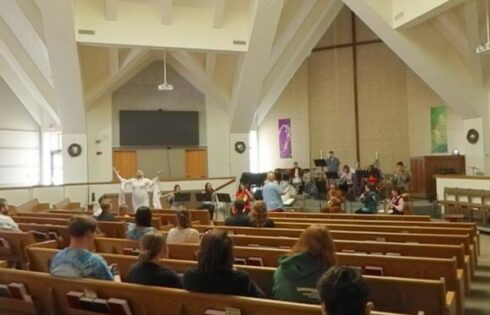
Role-playing features hectic schedules, cops, pawnbrokers
Students around the country are taking part in “poverty simulations,” extended scenarios put on by numerous university administrations that purportedly depict the real-life experiences of impoverished people.
“The poverty simulation is a large-scale, three-hour simulation where participants role play one month in the lives of families living in poverty,” states the website of Loyola University Chicago. That school has been offering the simulation since at least 2016. During these events, students “adopt the roles of impoverished families and must interact with the many community agencies that both help and hinder survival of the poor in our society.”
A video the university published after one of its simulations shows staff debriefing students on their experiences, claiming that the simulation proves a need to “challenge some of our basic assumptions” during the process of redesigning America’s health care system.
At Virginia Commonwealth University, the school recently held a similar event, one that was intended to “create a broader awareness of the realities of poverty.”
A university press release on the event says that it included simulated cops who “can put people in jail based on how they look.” Other scenarios include one in which “a professor might kick a student out of class if she brings her baby.” One participant said the simulation “highlights what populations may be at a disadvantage when it comes to trying to obtain certain services or access to certain services.”
The University of Maryland, Baltimore runs a considerable number of the simulations. The school’s website displays no less than eight upcoming simulated poverty experiences. “Participants will experience some of the daily challenges a family in poverty may endure over a simulated experience of one month,” the school’s website states.
Numerous other institutions of higher learning also host these simulations. Drake University, the University of Michigan, the University of Texas at Austin and the University of Alabama are just a few notable examples.
The College Fix reached out to all of the named schools to learn more about their experiences with the simulation. Only Elizabeth Micalizzi, the administrative director of VCU’s Center for Interprofessional Education and Collaborative Care, responded. She told The Fix she could not share any materials related to the simulation, though she said that the event was free for students who wish to participate.
Micalizzi said that the experience of the simulation is different for everyone who takes part in it. “Each participant role has different outcomes for every simulation,” she said.
Numerous roles needed for simulations
The Missouri Community Action Network is one of the producers of simulation kits used across all colleges and universities. The materials in the network’s kit assign the roles each participant will play in the simulation. Some of the characters are allowed to commit crimes and buy and sell guns, while the participants role-playing bankers, pawnbrokers, law enforcement officers and social service workers are charged with various professional services
One role in the simulation is that of an “Illegal Activities Person” whose listed “responsibilities” include committing robbery, selling drugs and recruiting others to do the same. The illegal activities person also is also issued a “gun” at the outset of the simulation. The “Pawnbroker” role, meanwhile, is responsible for cashing checks, buying household items, and selling guns.
The “Police Officer” role is delegated with tasks such as assisting families who have been illegally evicted, distributing gun permits and taking into protective custody children who have been “left alone.” Police characters are instructed to keep an eye on teenage gangs and imprison any characters who are participating in illegal activity.
The Missouri Community Action Network sells the kits for $2,300.
MORE: School bans ‘expensive’ jackets due to ‘poverty shaming’ of students
MORE: College textbook says ‘capitalism explains the persistence of poverty’
IMAGE: StanislauV / Shutterstock.com
Like The College Fix on Facebook / Follow us on Twitter






Please join the conversation about our stories on Facebook, Twitter, Instagram, Reddit, MeWe, Rumble, Gab, Minds and Gettr.